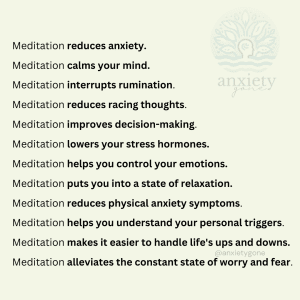Full Disclosure: Clicking on these links could mean a tiny commission for me, at no extra cost to you.
Imagine this: you’re sitting in the middle of a restaurant at dinner rush, your heart is racing and your palms are sweating, overwhelmed by the simple task of being there. Sounds familiar? You’re not alone. Anxiety sneaks into our lives in all different kinds of ways, turning even the most mundane decisions and activities into seemingly-unbeatable endeavours. Fortunately, there are all kinds of amazing coping strategies for anxiety disorders to make those scary interactions a little more manageable. And meditation is certainly one of them. It’s even been proven to produce positive changes in brain wave patterns, reduce stress levels and even reducing anxiety by up to 50%. So, let’s pour ourselves a cup of herbal tea, sit in a lotus pose and get ready to harness the benefits of using meditation for anxiety relief.
Ready to take control of your mental health
The Mindfulness app offers guided meditations, stress relief techniques, and personalized plans to help you stay calm and focused. For a limited time, enjoy an exclusive discount just for our readers!
Don’t miss out – anxiety relief is just a tap away!
What is Meditation?
Meditation is so much more than a buzz world, friends. It is a life-changing practice that is all about focusing the mind and calming the senses to achieve a state of deep peace and mental clarity. It typically involves a variety of relaxation techniques, such as deep breathing and mindfulness to further increase self-awareness, focused attention and calmness, so you can observe your thoughts without judgment and let them pass, to quiet your mind completely.
9 Types of Anxiety Meditations to Consider Trying
There are approximately nine popular types of meditation practice, with each offering its unique focus, meditation techniques and benefits. There are just as many different ways to practice each one too (more on that later). It’s important to try all types to find the best meditation for anxiety for you specifically.
To help you get started, here are some of the main types:
1. Mindfulness Meditation: Focusing on the Present Moment
Mindfulness meditation, rooted in Buddhist traditions, is the most widely practiced and studied form of meditation in Western cultures. During mindfulness meditation, you observe your thoughts without judgment or attachment, simply noting any recurring patterns. The meditation technique merges focus and awareness, often involving concentration on an object or your breathing while acknowledging various bodily sensations, thoughts, or emotions.
2. Spiritual Meditation: Peace from a Higher Source
Spiritual meditation is a fundamental practice within many religions and spiritual paths. It can consist of all kinds of meditation techniques, including the ones mentioned in this article. The purpose of spiritual meditation is to deepen your understanding of spiritual or religious meanings and enhance connection with God, or whatever belief you have.
Whether practiced at home or in a sacred space, spiritual meditation offers powerful benefits for those seeking spiritual growth and a closer bond with a higher power or spiritual essence.
3. Movement Meditation: Finding Peace in Moving
Movement meditation is a combination of physical activity and meditation, an ideal option for anyone who finds peace while working out or doing something active. Plus, you get to knock off two self-care activities at the same time.
Common forms of movement meditation include walking through a garden, practicing yoga, or performing tai chi. These activities allow you to focus deeply on your movements and breathing, for a unique blend of physical and mental relaxation.
4. Mantra Meditation: The Power of Repetition
Mantra meditation involves repeating a sacred word or phrase to focus the mind and deepen the meditative experience. This form of meditation is found across various traditions, with practitioners often choosing mantras that are personally meaningful or spiritually significant. For example, a mantra meditation for anxiety disorders would use a positive phrase or anxiety affirmation that is helpful or inspiring to someone struggling with feelings of anxiety.
By continuously repeating a mantra, you can achieve a state of enhanced concentration and tranquility. This meditation technique is particularly effective for those who benefit from a more structured approach to meditation, providing a clear and simple path to calmness and inner peace. Whether whispered, spoken, or chanted, mantra meditation is a fun and powerful way to clear the mind and spirit.
5. Focused Meditation: Narrowing in on the Target
Focused meditation is a practice that sharpens the mind by concentrating on a single point of reference. it can involve anything from a specific sound or visual object to a simple breathing technique.
By directing all attention towards the chosen focal point and repeatedly bringing the mind back when it wanders, you can enhance your concentration and mental clarity, while clearing your mind of anxious thoughts and worries.
It’s also a great meditation for anxiety, as it grounds you and helps combat dissociation.
6. Transcendental Meditation: Channeling Your Inner Mantra
Transcendental Meditation (TM) is a specific form of silent mantra meditation, characterized by its effortless and structured approach. During this type of meditation you use a personalized mantra, typically a word or sound, which is silently repeated to help settle the mind into a state of deep relaxation and increased awareness.
This method is designed to be practiced twice daily for about 20 minutes each session, and is particularly recognized for its ability to reduce stress and enhance self-development without concentration or contemplation. It is suitable for anyone seeking a simple, effective meditation technique to achieve deeper states of consciousness and overall well-being.
Ready to Transform Your Mind
Struggling with anxiety and stress? Discover the InnaPeace program for scientifically-backed techniques to help you manage stress, reduce anxiety, and find mental clarity. Start your journey to a calmer, more.
Get Started
7. Progressive relaxation: Tuning into Physical Sensations
Progressive relaxation, also known as body scan meditation, is a technique designed to reduce stress and activate your relaxation response by tensing and relaxing different muscle groups throughout the body. This method helps you become more aware of physical sensations and areas of tension, promoting a deep sense of calm. It’s a great meditation for anxiety as well because it helps you acknowledge physical anxiety symptoms without giving them too much attention.
8. Visualization Meditation: Finding your Happy Place
Visualization meditation is a technique that involves focusing the mind by visualizing a specific image, place, or scenario to achieve a state of calm. This form of meditation is particularly effective for enhancing peace and relaxation by engaging the mind’s eye to imagine tranquil scenes or positive outcomes. It can be used as a meditation for anxiety as well, allowing you to drift away to a calm, quiet place even if your physical surroundings are chaotic.
There’s no limits on how you can use this meditation either. You can visualize yourself succeeding in future endeavors, or sitting on a sandy beach or a quiet forest. In addition to helping ease anxiety and stress, visualization promotes a positive mindset and increases mental clarity, making it a powerful tool for anxiety disorders, personal growth and stress management.
9: Loving-kindness Meditation: Achieving Peace through Compassion
Loving-kindness meditation, also known as Metta meditation, focuses on building an attitude of love and kindness towards everything, even one’s enemies and sources of stress. During the practice, you silently repeat phrases that express goodwill and compassion towards yourself and others. Common phrases include “May I be happy,” “May I be healthy,” transitioning to “May you be happy,” “May you be healthy.”
This form of meditation is beneficial for creating a greater sense of empathy and positivity, as it encourages you to extend feelings of compassion outward. It’s an amazing healing tool for letting go, reducing feelings of anger and increasing overall emotional resilience.
The Link Between Meditation and Anxiety Relief
Meditation doesn’t just feel good; there’s science to back up its benefits.
Studies have shown that meditation can change the brain’s structure and function. It increases the grey matter in areas associated with memory, learning, and emotional regulation. It also decreases the size of the amygdala, the brain’s fear center, which helps reduce anxiety.
Research has also consistently shown that meditation can lower anxiety levels. A study by Johns Hopkins University found that mindfulness practice can reduce symptoms of anxiety, depression, and pain.
Another study published in JAMA Internal Medicine found that meditation programs can improve anxiety symptoms, especially when practiced regularly.
16 Evidence-Based Benefits of Anxiety Meditation
When it comes to benefits, meditation certainly doesn’t fall short of those, offering an abundance of benefits for your physical, emotional, spiritual and mental health.
Here are some of the specific perks of using meditation for anxiety relief, specifically:
1. Reduced Anxiety & Stress Levels
Meditation helps calm the mind and reduce the production of stress hormones like cortisol. This can lead to a significant decrease in overall stress levels and anxiety 1.
Additionally, learning how to meditate will help you develop the skills needed to manage anxiety in the midst of it. For example, if you tend to dissociate when you have an anxiety attack or panic attack, meditation can ground and center you. This helps break that fear cycle quickly, calming your anxiety.
2. Better Emotional Regulation
By practicing meditation regularly, you can develop better control over their emotions 2. This means fewer mood swings and a more balanced emotional state.
3. Enhanced Self-Awareness
Meditation encourages self-reflection and mindfulness, helping you become more aware of your thoughts and feelings. This increased self-awareness can lead to better decision-making and a clearer understanding of personal triggers for anxiety 3.
4. Increased Resilience
Regular meditation practice can build mental resilience, making it easier for you to navigate life’s ups and downs without becoming overwhelmed.
5. Greater Sense of Calm and Peace
Meditation promotes a state of relaxation and tranquility, which can help alleviate the constant state of worry and tension often associated with generalized anxiety disorder.
6. Lower Blood Pressure
Meditation has been shown to help lower blood pressure, which can reduce the physical symptoms of anxiety such as headaches and heart palpitations.
7. Improved Sleep Quality
Meditation can improve the quality of sleep by calming the mind and reducing the racing thoughts that often keep people awake at night. Better sleep contributes to lower anxiety levels.
8. Stronger Immune System
A relaxed and less stressed body is better equipped to fight off illnesses. Meditation can boost the immune system, making you less susceptible to common or stress-related illnesses.
9. Reduced Muscle Tension
Anxiety often leads to physical symptoms like muscle tension and stiffness. Meditation helps relax the body, reducing these physical symptoms of anxiety.
10. Better Breathing
Breathing exercises in meditation improve respiratory function, which can reduce the feeling of breathlessness and panic often associated with anxiety.
11. Improved Focus and Concentration
Meditation helps improve attention span and concentration by training the mind to focus on the present moment. This can lead to better performance in daily tasks and also makes it a powerful anxiety reduction technique. For example, by using this meditation for anxiety, the next time you’re feeling anxious you’ll know how to redirect your attention away from the anxiety attack and feelings of anxiety.
12. Greater Mental Clarity
Regular meditation can clear the mental fog, leading to sharper thinking and better problem-solving abilities. This can help reduce anxiety by making it easier to manage complex situations.
13. Less Rumination + Soothing for an Anxious Mind
If there’s one thing all anxious beauties can relate to, it’s a racing mind and this is exactly why mediation for anxiety is so effective. Not only can meditation soothe an anxious mind, it can also help break the cycle of negative thinking and overanalyzing, which are common in anxiety disorders. By learning to let go of unproductive thoughts, you can experience a serious reduction in anxiety symptoms. Plus, you can finally get some silence from those overwhelming, intrusive thoughts.
14. Enhanced Relationships
By reducing stress and improving emotional regulation, meditation can lead to better relationships. A calmer, more mindful approach can improve communication and reduce conflict.
15. Increased Empathy and Compassion
Meditation practices, especially those focused on loving-kindness, can increase empathy and compassion towards others. This can lead to more meaningful and supportive relationships.
16. Greater Sense of Purpose
As an anxiety sufferer, the first thing you feel after an anxiety attack is disappointment. Suddenly, you feel abnormal, worthless, weird and ashamed, which only makes you feel worse. Meditation teaches you how to detach yourself from your mental illness. It helps you connect with your inner self and find a greater sense of purpose and meaning in life. This can reduce anxiety and help decrease feelings of depression. separates your feelings from your thoughts and ultimately, your mind from your body. It’s all about remaining centered.
How to Start Meditating for Anxiety Relief
Starting a meditation practice might seem daunting, but it doesn’t have to be. It’s important to find one that resonates with you, so be sure to try different types to see what works best for your anxiety relief.
Schedule your meditation sessions at a specific time each day. This could be right after waking up or as a part of your nightly self care routine. Starting with short sessions of a 7 minute meditation or less to help establish the habit, and you can gradually increase the duration over time.
Once you have chosen a meditation schedule, stick with it or at least 80% of the time. It’s okay if you miss a day; consistency is more important than perfection.
After two weeks, check in with yourself to notice any positive changes, which can motivate you to continue.
Other than that, create a quiet, comfortable space where you won’t be disturbed. This can be something as simple as corner in your room decorated with a comfy meditation pillow so you can easily get into a comfortable position. The key is to make sure it’s a place where you feel relaxed and can focus. Remember, meditation can also be practiced anywhere, as needed, even in the busiest, most chaotic environments.
Ready to Transform Your Mental Health?
Inward Breathwork offers guided breathwork sessions designed to reduce stress and enhance your well-being.
Try it now with a 14-day free trial and feel the difference breathwork can make.
Don’t wait – your path to peace begins with a single breath.
Anxiety Meditation Apps and Tools
There are many apps and tools available to help you on your meditation journey, such as:
- Best for guided meditations → Headspace (Get a 14-day free trial here)
- Best for mindfulness exercises → Mindfulness App
- Best for tapping meditations → The Tapping Solution (get a 14-day free trial here)
- Best for binaural audio tones → Binaural Beats Therapy
- Best for 3xPureTone™ brainwave → Inna Peace Meditations (get a free gift here)
- Best for sound healing → Sacred Sound System
You may also want to consider using tools like meditation cushions, calming incense, or calming music to enhance your practice. These accessories can help create a more immersive and relaxing experience.
Combine Anxiety Meditation with Other Therapies for Maximum Benefits
Meditation can be even more effective when combined with other therapies.
Combining meditation with Cognitive Behaviour Therapy (CBT) can help address both the symptoms and underlying causes of anxiety disorders. While cognitive therapy works on changing negative thought patterns, meditation helps calm the mind and reduce stress.
Some of the best online therapy services are:
- Best for Availability → BetterHelp
- Best for Couples → ReGain
- Best for Psychiatry → Hims/Hers
- Best for Teens → Teen Counseling
- Best for Anxiety and Depression → Brightside
- Best for LGBTQIA+ → Pride Counseling
You can also tap into some online yoga classes that combine physical postures, breathing exercises and meditation all into one. The combination of movement and mindfulness exercises can be particularly effective in reducing anxiety symptoms.
Final Thoughts
Incorporating a regular meditation practice into your routine can have a powerful impact on managing anxiety and promoting overall well-being. Remember, like any new skill, it may take some time and patience to see the benefits of meditation for anxiety, but with consistent meditation practice, you may be surprised at how much calmer and centered you feel. So take a deep breath, give yourself permission to slow down and try incorporating mindfulness exercises and meditation into your daily routine. Your mind and body will thank you!
FAQ about Anxiety Meditation
1. Does meditation help with anxiety?
Yes, meditation has been shown to effectively manage anxiety by reducing the size of the amygdala, which is responsible for the stress response, and strengthening the prefrontal cortex, which aids in rational thought. Numerous studies support its efficacy in treating anxiety.
2. How long should you meditate each day for anxiety?
The key to benefiting from meditation is consistency rather than duration. Even short daily sessions of 5 to 10 minutes can significantly help manage anxiety. As you become more comfortable, you can gradually extend your sessions to 20 minutes or longer.
3. What calms down anxiety?
Activities such as yoga, exercise, meditation, and talk therapy can help reduce anxiety by calming the mind and promoting relaxation and peace.
4. Can I use meditation to manage panic attacks?
Yes, meditation techniques like Box Breathing and the Five Senses Meditation can help manage panic attacks by maintaining breath awareness and focusing on present sensations.
Infographics on Anxiety Meditation
References:- Turakitwanakan, W., Mekseepralard, C., & Busarakumtragul, P. (2013). Effects of mindfulness meditation on serum cortisol of medical students. Journal of the Medical Association of Thailand, 96(Suppl. 1), S90-S95. PMID: 23724462
- Farias, M., Wikholm, C., & Delmonte, R. (2016). What is mindfulness-based therapy good for? The Lancet Psychiatry, 3(11), 1012-1013. doi:10.1016/S2215-0366(16)30211-5. PMC6795685.
- Keng, S.-L., Smoski, M. J., & Robins, C. J. (2011). Effects of mindfulness on psychological health: A review of empirical studies. Clinical Psychology Review, 31(6), 1041-1056. doi:10.1016/j.cpr.2011.04.006. PMC3679190.










